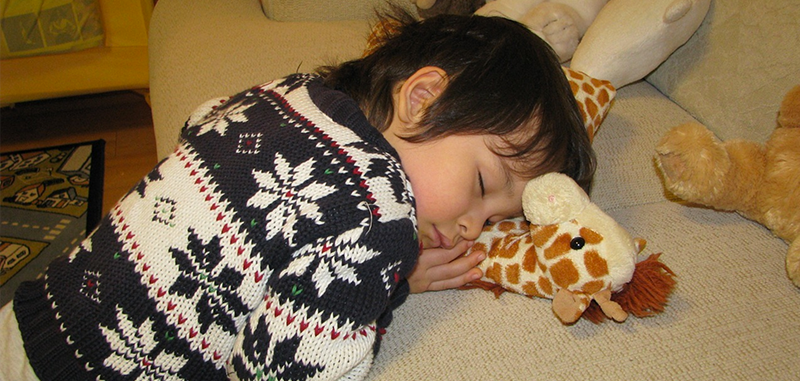What are the positive effects of napping on memory?

Baby naps are a major concern for many parents: "Why are they so important? Is my baby getting enough daytime sleep? How can I help them rest better?" This guide is here to answer these key questions and provide reliable guidance.
Far more than just a break in the day, napping plays a vital role in your child's development and overall well-being. It supports learning, regulates mood, and even improves nighttime sleep quality. With the right approach, you can enhance the quality of each nap, making sure your little one gets the truly restorative rest they need.
In this article, we’ll explore how to establish consistent and soothing nap routines, how to tell if your child is getting enough sleep during the day, and the common mistakes to avoid. By following these tips, parents can turn naptime into a peaceful, nurturing experience tailored to each child’s unique needs—helping them grow and thrive with confidence.
How Many Naps Does Your Baby Need Each Day?
Napping is a key part of your baby's development and well-being. It helps structure their day and naturally evolves over time, adjusting to their growing need for both stimulation and rest.
To help you navigate these changes, the table below offers age-appropriate guidelines on the average number of naps and typical daytime sleep durations for each stage.
Keep in mind these are general averages—every baby is different, and it's important to adjust based on your child’s individual needs.
| 🧒 Age | 😴 Number of Naps | ⏰ Total Daytime Sleep | ⏱️ Wake Window | 🕒 Typical Nap Times |
|---|---|---|---|---|
| 0 to 1 month | Very frequent | 8–10 hours | 30 min to 1 hour | Alternating naps and feedings throughout day and night |
| 2 to 3 months | 3 to 6 naps | 6–8 hours | 1 to 1.5 hours | Morning, after feeding, late afternoon |
| 4 to 7 months | 3 to 4 naps | 5–7 hours | 1.5 to 2 hours | Mid-morning, early and late afternoon |
| 8 to 14 months | 2 naps | 3–4 hours | 2 to 3 hours | Morning and afternoon |
| 15 to 23 months | 1 to 2 naps | 2–3 hours | 3 to 4 hours | Mid-morning and early afternoon |
| 2 to 3 years | 1 nap | 1.5–2 hours | 4 to 5 hours | Early afternoon |
| 3 to 5 years | 1 nap (may vary) | 1–1.5 hours | 5 to 6 hours | Early afternoon |
👉 What’s the Ideal Nap Length for Babies?
The length of a baby’s nap usually depends on the duration of a sleep cycle—around 40 to 45 minutes for infants. Depending on their age and level of tiredness, your baby may complete one or more cycles during a single nap. This explains why nap lengths can vary. Here are some helpful benchmarks:
- 45-minute nap: your baby completed one sleep cycle. This is perfectly normal for a short nap, especially in younger infants.
- 1.5-hour nap: your baby went through two full sleep cycles.
It’s also totally normal if your child sleeps longer than this! We’ll cover later in this article whether or not you should wake a sleeping baby from a long nap.
Babies often experience a brief "micro-awakening" between sleep cycles. If they’ve been moved, if the environment has changed (such as the lullaby stopping), or if they fell asleep in a parent’s arms, they may struggle to fall back asleep on their own—just like at night.
To help your baby continue sleeping soundly, try not to move them during the nap and make sure that the sleep conditions stay consistent after about 30 to 45 minutes. This will increase the chances of a smooth transition between cycles and encourage longer, more restful naps!
👉 When Should the Last Nap of the Day Be?
To encourage better nighttime sleep, it's important to stick to an age-appropriate cutoff time for your baby’s last nap of the day.
It’s not so much the length of that final nap that matters, but making sure your child is awake long enough in the late afternoon to build healthy sleep pressure. This helps maintain a balanced wake-sleep rhythm. Here are some helpful time limits to follow:
- 4 to 6 months: Last nap should end by 5:30 PM
- 6 to 9 months: Last nap should end by 5:00 PM
- 9 to 12 months: Last nap should end by 4:00 PM
- After 12 months: Last nap should end by 3:00 PM
Sticking to these guidelines allows your child to build the right amount of sleep pressure by evening, making bedtime smoother and nighttime sleep more restful and restorative.
👉 How Can You Tell If Your Baby Slept Enough?
The best way to know if your baby had a good nap? Their mood when they wake up! If your baby wakes from a shorter nap but seems happy and content, chances are they got the sleep they needed. On the other hand, if they’re cranky after less than 45 minutes, it likely means the nap wasn’t long enough.
Here are some signs your baby had a restful nap and is well recharged:
- They wake up cooing and appear calm and relaxed;
- They stay awake and alert without showing signs of tiredness right away;
- They handle small frustrations more easily throughout the day;
- They’re able to focus on age-appropriate activities;
- They’re curious and enjoy exploring their surroundings without being fussy;
- They don’t have daily “evening meltdowns”—frequent crying spells at the end of the day can be a sign that their sleep-wake rhythm needs adjusting.
By watching for these cues, you can gradually fine-tune your baby’s nap schedule to support their balance and overall well-being.
That said, if your baby takes a short nap every now and then, there’s no need to worry. As long as they’re in a good mood and show signs of well-being during the day, that nap may have been just right for them. In these cases, pay attention to their behavior: their energy levels and general demeanor will tell you if their sleep rhythm is working!
The Importance of a Good Sleep Environment for Naps
The sleep environment plays a key role in nap quality—especially for babies who are light or sensitive sleepers. Unlike nighttime sleep, a baby’s body does not produce melatonin during the day, making it harder to fall asleep. Here are some practical tips to help your child nap more easily by creating a calm, sleep-friendly space.
- Soften the lighting to help baby relax: Light levels directly affect melatonin and cortisol—hormones that regulate the sleep-wake cycle. While it’s important for young babies (especially under 3 months) to distinguish between day and night, dimming the room slightly during naps can help if your little one struggles to settle. A softly lit or slightly darkened space can make a big difference.
- Pay attention to room temperature: A baby’s body temperature rises during awake time and naturally drops when it’s time to sleep. This cooling helps trigger sleepiness. Avoid overdressing your baby before naps, and keep the room comfortably cool to support this natural dip and ease them into sleep.
- Respect wake windows: A good balance between awake time and rest is key. Too much or too little awake time can make it harder to nap. Watch for sleep cues—like yawning or eye-rubbing—and if needed, refer to the age-based nap chart to adjust timing according to your child’s needs.
- Wait for the next “sleep train” if you've missed the window: Daytime sleep cycles last about 30 to 45 minutes and include brief micro-awakenings between stages. If the ideal nap window has passed, wait another 30–45 minutes for the next cycle. This helps build sleep pressure and supports a smoother transition into sleep.
Bringing these elements together helps build what’s known as sleep pressure—the natural buildup of sleep need that occurs with wakefulness. This sleep pressure needs to be strong enough for your baby to fall asleep easily and enjoy a truly restorative nap. By managing wake windows, crafting a calm sleep environment, and respecting natural sleep cycles, you help your baby nap better, fall asleep more easily, and get the quality rest that’s so essential for healthy growth and emotional well-being.
A calm, soothing moment right before naptime helps your baby wind down from active play and acts as a clear signal that sleep is coming. For best results, try to include the same cues you use at bedtime. This consistency helps your baby associate those actions with sleep, whether it’s during the day or at night.
That said, the nap routine can be shorter than the evening one, since you may not have as much time to prepare. A quick cuddle, a short ritual, and a few gentle words are often enough to recreate a familiar, comforting environment for a quality nap.
Outdoor naps even come with a unique benefit: natural daylight exposure helps regulate your baby’s internal clock, which can lead to more peaceful nights. So taking naps outside is a great idea—it offers quality rest while also supporting a healthy day-night rhythm.

How Baby Naps Evolve with Age
👉 Naps for Babies Under 4 Months:
For babies under four months, nap routines develop gradually—with flexibility and gentle guidance. At this stage, it’s helpful to alternate between independent naps (where baby sleeps in their crib) and contact naps (in a carrier, on the breast, or in your arms). This mix supports your baby’s slow transition toward independent sleep. Over time, these dependent naps can be reduced, often leaving just one by around four months—usually the last nap of the day.
To establish a peaceful rhythm that supports sleep, a simple routine like wake, feed, play, sleep can be very effective. This flow encourages feeding right after waking, which prevents baby from dozing off mid-feed. Eating after a nap also means baby is more alert, aiding digestion. This kind of structure creates an ideal balance where each part of the day has its place—promoting healthy sleep and awake times.
👉 Naps from 4 to 15 Months:
From four months onward, having a consistent nap routine becomes especially helpful. Even if it’s shorter than the bedtime routine, it gives your baby comforting cues that it’s time to wind down. Dimming the lights, for example, can be a powerful signal—especially as your baby’s sensitivity to light and sleep rhythms increases.
When it’s naptime, lay your baby in their crib with their lovey or favorite comfort item, and stay close by. If they cry, gentle words, soothing gestures, and your calming presence are often enough to help them settle.
Encourage quiet rest for about an hour. If your baby doesn’t fall asleep despite your efforts, take a short break—perhaps a quiet feed or calm play—and try again in 20 to 30 minutes. Sometimes, this little reset is all it takes to ease into sleep more naturally.
It’s important to maintain regular naps throughout the day. These rest periods are essential for your baby’s recovery and directly impact the quality of their nighttime sleep.
Also, avoid treating naps as just a “break time.” Skipping naps too early can lead to overtiredness, especially at this age when babies still need plenty of daytime sleep to support healthy development.
There are several cues that your baby may be ready for this change—for example, struggling to fall asleep for the third nap, even when being rocked or held, or the first two naps becoming so long that a third one would interfere with late afternoon wake time (see table above).
You might also notice that keeping the third nap makes it harder for your baby to fall asleep at bedtime. This can be a sign that their daytime sleep needs are starting to decrease. Wake windows also begin to stretch naturally during this stage: they may remain short in the morning (1.5 to 2 hours), but often extend to 2.5–3 hours around midday and up to 4 hours by late afternoon.
When dropping the third nap, it can be helpful to move bedtime earlier by about 30 minutes. During this adjustment period, it’s perfectly normal for your baby to go to bed as early as 6:30 PM. As a result, many babies begin sleeping longer stretches at night—up to 13 hours—which helps ensure they’re getting the rest they need.
👉 Naps from 15 Months to 5 Years:
Between 15 months and 5 years, naps remain an important need for most children, though the way they nap evolves over time. At this age, it’s best to have naps consistently in the child’s bed, helping them associate that space with rest. A short nap routine—about 5 to 10 minutes—can still be helpful, and it doesn’t have to be identical to the bedtime routine. A special naptime ritual might include a gentle story, a cuddle, or a few soothing words to create a calm transition into daytime sleep.
Even as daytime sleep needs begin to decrease, it’s beneficial to maintain a quiet time, especially for 4-year-olds who may no longer nap daily but still benefit from a restful break. Some children will still need a full 2-hour nap, while others might do well with something shorter. Either way, offering this regular rest period is a valuable part of their routine—supporting their well-being and helping prevent late-day fatigue.
The most common sign that your child is ready for this change is difficulty falling asleep for one of the two usual naps, often the morning one. But be careful: it’s important not to confuse temporary resistance with a real need to drop a nap. The best indicator is still your child’s mood. If they skip one nap but still fall asleep easily at night and stay happy, alert, and energetic during the day, they’re likely ready for just one nap. If bedtime becomes more difficult after skipping a nap, it might still be too soon.
This transition requires some flexibility. In the early weeks, it’s helpful to shift bedtime earlier by about 30 minutes to compensate for the longer afternoon wake time. At the same time, adjust the afternoon nap based on recommended wake windows. For instance, if your 15-month-old wakes at 7:30 AM, offer naptime around 11:30 AM or 12:00 PM—keeping wake time under 4 hours.
And remember, it’s normal—and even healthy—to stay flexible during this transition. Some days your child might still need two naps, and that’s okay. A gradual approach will make the shift to one nap smoother and more respectful of your child’s individual needs.

"Should You Wake a Sleeping Baby from a Nap?"
This is a question every parent asks at some point! In general, it’s best not to wake a sleeping child. A long nap doesn’t disrupt nighttime sleep—in fact, it can help! A well-rested baby will usually fall asleep more easily at bedtime. That said, if you have an appointment or something unexpected comes up, waking your child occasionally is fine and won’t cause any harm.
The key factor to watch is your child’s wake window, more than the exact length of the nap. Instead of asking, “Did my baby nap long enough?” it’s more helpful to ask, “Was their awake time appropriate?” If the wake window is too short, your child may not have enough time to expend energy, which can throw off sleep cycles. On the other hand, too long of a wake window can lead to overtiredness and make falling asleep harder at night.
Here are some helpful guidelines to balance wake time and naps based on your child’s age:
- From 18 months: For children on a single nap, an ideal wake window is 5 to 6 hours. If bedtime is around 7:00–8:00 PM, try to avoid naps starting after 3:30 PM. Likewise, if your child wakes early—say at 6:00 AM—they may need a nap around 11:00 AM.
- From 3 years old: Sometimes, a long afternoon nap pushes bedtime too late. In this case, try to end the nap by 2:30–3:00 PM to allow for an active afternoon and an easier transition to sleep at night.
By respecting your child’s natural rhythm of rest and activity, you’ll help support their development and build a healthy, balanced sleep-wake cycle!
What to Do When Your Child Refuses to Nap
It’s perfectly normal for a child to sometimes resist naptime. Life is just too exciting! Your little one probably wants to stay up, play, and be with you. But there’s a big difference between what they want (to keep playing) and what they need (to rest and grow). And as adults, we can relate—how often do we stay up scrolling or watching TV when we know we should be getting sleep?
Some activities, especially screen time (TV, phones, tablets), make falling asleep harder by disrupting melatonin production. So if sleep can be a challenge for us, it’s even more so for a small child!
The key is to stay confident and consistent. Your child NEEDS their nap, even if they don't feel like it. Skipping the nap isn’t the solution—it can lead to an overtired child who struggles even more to fall asleep at night. Even if it takes a while—sometimes up to 2 hours—it’s worth it if your child gets even 10 minutes of rest. A short nap still offers real benefits. Let them know, gently but clearly, that this rest time is important for their health and energy, and that they need to stay in bed until they fall asleep. You’re setting a boundary that won’t change.
If your child cries, it can be tempting to let them out of the room or distract them—but be careful. They may quickly learn that a few minutes of crying means they can skip the nap. This could lead to a cycle of sleep debt and more meltdowns later in the day. On the other hand, a consistent approach—sticking to naptime for 4 or 5 days without interruptions—often helps even the most stubborn nappers settle into a calmer, more restful routine.
Discover REMI
THE SMART BABY MONITOR 😊
REMI and its app bring together everything you need to manage your baby’s sleep!
Its mission? Helping families sleep better — from birth up to age 10.
I bought REMI for my 4-year-old son who didn’t want to sleep alone anymore after his little sister was born. Thanks to the remote wake-up system and bedtime stories I can play from a distance, the issue is completely resolved! I 100% recommend this purchase!






 My Child Won’t Sleep Alone: How to Help Them Gain Independence
My Child Won’t Sleep Alone: How to Help Them Gain Independence
 Letting Baby Cry It Out: Effective, But At What Cost?
Letting Baby Cry It Out: Effective, But At What Cost?
 White noise for baby : a scientific research !
White noise for baby : a scientific research !
 What are the positive effects of napping on memory?
What are the positive effects of napping on memory?
 What Time Should Your Child Go to Bed? The Ideal Bedtime by Age!
What Time Should Your Child Go to Bed? The Ideal Bedtime by Age!